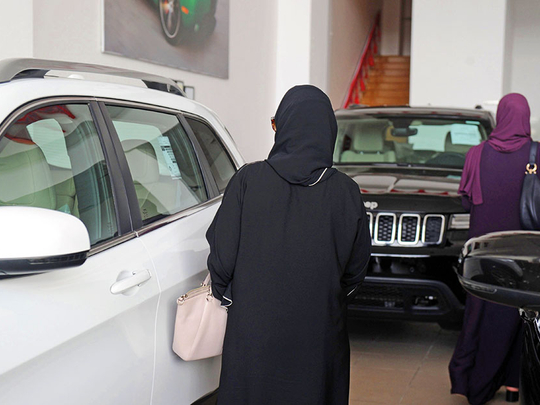
Dubai: Starting today (June 24), change is not only showing up on roads across Saudi Arabia, it is very much evident at car dealerships and showrooms. With women finally being able to get behind the wheel, Saudi Arabia is potentially looking at a 5-10 per cent additional boost in new car sales this year.
After what has been an exceptionally difficult 12 months for automotive sales, dealerships and manufacturers will be willing to take whatever gains come their way from women driving. Car showrooms are already wearing a festive look in anticipation of better numbers — for others, it’s as if this year’s Eid promotions haven’t concluded.
Al Jazirah Vehicles Agencies Co, the kingdom’s Ford distributor, has revamped its showroom along Riyadh’s Takhassosy road and “plans are underway to roll this out over the next months,” according to Crystal Worthem, marketing director at Ford Middle East and Africa.
- Crystal Worthem | Marketing director at Ford Middle East and Africa
“Our dealership facilities will evolve as our new female customer groups evolve. We have seen pick-up in demand from female customers since the royal decree was announced. Our focus is to deliver a stress-free ownership experience to our new Saudi female customers. This would encompass their experience on the showroom floor as well as the service and maintenance solutions and — most importantly — the roadside assistance features.”
The industry is leaving nothing to chance. Some showrooms have designated entrances for women-only visitors and dedicated areas for them to cast an eye over the models and make their decisions.
Industry sources, however, add an upturn in new car sales to women drivers is likely to happen gradually in the weeks ahead and then change a gear or two in the fourth quarter of 18 when new models vehicles start making an appearance.
The biggest immediate beneficiary could be in the premium and luxury category, where it is reckoned that likely buyers most likely already hold non-Saudi driving licences and would want to make their presence felt as soon as they are issued a Saudi one.
A few thousand licences have been issued to women so far, with about 50,000 plus awaiting their turn. The thinking within industry circles is that if 20-25 per cent of these drivers are induced to go in for a new car, that in itself would make for a good start.
And apart from individual buyers, there could be demand from rent-a-car operators and driving schools.
- Prashant Kolleri | Managing director for Saudi Arabia and Pakistan at Kantar Insights
Marketing consultants, however, suggest that industry players should not let their hopes get ahead of themselves.
“[The] sales impact will be positive — but this will be a slow change,” said Prashant Kolleri, managing director for Saudi Arabia and Pakistan at Kantar Insights.
“The segment size of immediate buyers of new cars may not be huge. In the medium term, the adoption of car driving will depend on [many] factors. Additionally, women’s participation in the economy through employment, entrepreneurship and them viewing car ownership as a facilitator could be an important factor.
“Given the significance of change, initiatives that support confidence building, partnering women make the right choice in terms of product functionality and image will play a big role. [A] deeper understanding of women motorists’ needs will be very important for brands to be in their choice set.”
Car dealerships in the UAE, going through a third successive year of indifferent sales, will be casting a close watch on Saudi proceedings. In particular, they will be keen to see whether the used-car market too will benefit from the changes brought on in the kingdom.
But Saygin Yalcin, CEO of Sellanycar.com, said much still needs changing in regard to used car regulations. Saudi Arabia’s used car market is three to five times bigger than the UAE used car market, but suffered a “major” hit in the past 12 months.
“First of all, the regulations do not distinguish between ownership and intent to drive a vehicle,” he said. “Title transfer processes are unnecessarily cumbersome and do not protect buyers and make sellers’ lives difficult. All cars need to pass vehicle tests before selling.
“If you cannot own a car before fixing it, it is a burden to the seller to do so before title transfer or a risk for the buyer to commit expenses before being able to legally own a car.
- Saygin Yalcin | CEO of Sellanycar.com
“The ‘mubaya’ [sales agreement] process is being misused for the above reasons. Consumers have major issues selling cars with damages or fines, as dealers cannot protect themselves before buying these cars. This means either the buyer pays for all the fines/damages [without legally owning the car] or the seller does [even though he might not have the necessary funds and even if the car’s value exceeds fixing and fine costs].”
Carmakers aren’t the only ones eyeing a good run
Careem and Uber too are making marketing and strategy tweaks to target the new rules allowing women to drive.
Uber plans to test a new feature that will allow women choice in being connected to women drivers.
The pilot programme will be rolled out in the fall and made fully available to all women drivers in the kingdom.
According to Pierre Dimitri Gore-Coty, vice-president & head of operations for Uber EMEA (Europe, the Middle East and Africa), “We have partnered with Saudi women to explore how Uber can work for them, and we will continue listening as we build the future of urban mobility in Saudi Arabia together.”
Careem, which has invested nearly $80 million (Dh293.84 million) over the past five years in its Saudi operations, is pumping in another $30 million this year. It has even got on board its first woman driver, Enaam Gazi Al Aswad.












